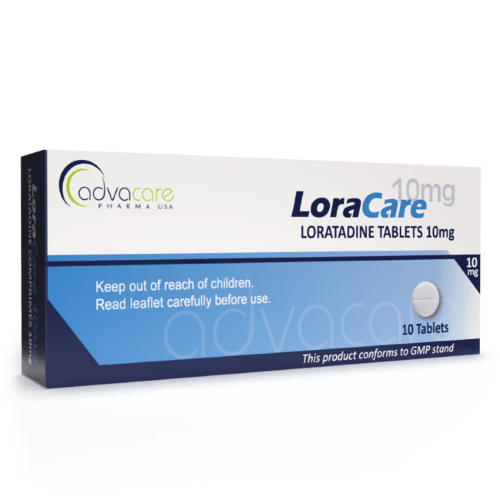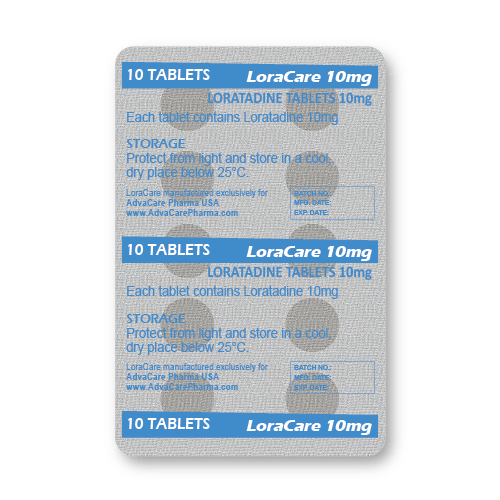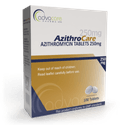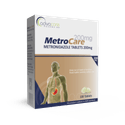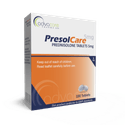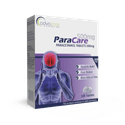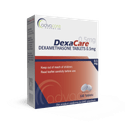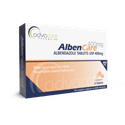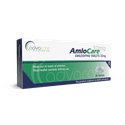- Home›
- Pharmaceuticals›
- Pharmaceutical Tablets›
- Loratadine Tablets
Loratadine Tablets
Dosage
Packaging
What is Loratadine?
Active Ingredients: Loratadine
Loratadine Tablets are used to manage allergic rhinitis and urticaria. This drug is used to relieve symptoms like pruritus, watery eyes, runny nose, and sneezing. This medication may temporarily relieve the symptoms associated with these conditions, but it does not prevent hives or other serious allergic reactions.
Loratadine is a second-generation antihistamine that targets peripheral H1 histamine receptors and can begin to work within 1 to 3 hours. It works by blocking the action of histamine, the chemical that mediates many allergy-related symptoms. Loratadine is an inverse agonist, meaning it does not inhibit the actions of antihistamine by binding to the active sites on H1 receptors, like a histamine antagonist would, but by binding at another site that favors the receptor’s inactive form.
Loratadine does not penetrate the central nervous system (CNS) effectively and has poor affinity for CNS histamine receptors. These properties make loratadine less likely to cause drowsiness and sedation than other antihistamines.
This medicine is also available in Oral Solution.
AdvaCare Pharma is a global distributor and manufacturer of Loratadine Tablets. This drug is produced in our GMP-certified facilities in China, India, and the USA. Our production facilities are regularly inspected to ensure our products meet global health, safety, and environmental standards.
Why are we a trusted Loratadine manufacturer?
We are a Loratadine manufacturer engaged in the global distribution of 200+ oral solid pharmaceutical products in tablet dosage form.
As an American-owned and operated company, we are devoted to the manufacture and supply of superior quality, yet cost-effective pharmaceuticals to improve access to healthcare solutions worldwide. AdvaCare Pharma manufactures Loratadine Tablets, and over 500 other pharmaceutical treatments, according to strict GMP regulations as part of our global commitment to bring efficacious medicines to pharmaceutical distributors, hospitals, pharmacies and other medical institutions.
Uses
What is Loratadine used for?
It is used to temporarily relieve symptoms caused by seasonal and year-round allergies, such as sneezing, itching, watery eyes, and runny nose. It is also used to relieve itching caused by hives.
How are Loratadine Tablets used?
This medication is intended to be taken orally. Tablets should not be crushed, chewed, or broken and should be taken whole. Loratadine Tablets may be taken with or without food.
What dose should be taken and for how long?
For the temporary relief of symptoms of allergic rhinitis and urticaria in adults, the recommended dose is 10mg once a day. Do not exceed a maximum dose of 10mg/day.
For the temporary relief of symptoms of allergic rhinitis and urticaria in children aged ≥ 6 years, the recommended dose is 10mg once a day. Do not exceed a maximum dose of 10mg/day.
Loratadine may be taken daily during allergy season and should be discontinued upon symptom resolution. If mild allergy symptoms persist after 3 days of treatment or hives persist after 6 weeks of treatment, an alternative therapy may be necessary.
The dosage is based on medical condition, response to treatment, age, and weight. Refer to a doctor or pharmacist for guidelines on dosage. Do not exceed what they advise.
What if a dose is missed?
Take a dose, if needed. Do not take more than one dose in a 24-hour period.
Who can use Loratadine?
Loratadine Tablets can be administered to adults and children (≥ 6 years), but caution is advised for specific groups of patients.
Pregnant Loratadine is likely safe to use during pregnancy. Animal studies have not shown evidence of teratogenicity or embryotoxicity. Limited human data have not shown evidence of increased risk of malformations or other potentially harmful fetal effects.
Loratadine should only be used as a short-term treatment during pregnancy if the potential benefit outweighs any potential risk to the fetus.
Nursing Loratadine is excreted in human milk in small amounts. Loratadine’s lack of sedative effects and low levels in milk are not expected to cause adverse effects in nursing infants.
Loratadine should only be used while nursing if the potential benefit outweighs the potential risk to the nursing infant. If deemed medically necessary, the lowest effective dose and shortest treatment duration should be used.
Pediatric The recommendations for dosage adjustments for children are as follows:
- In pediatric patients aged 2 to 5 years, the recommended daily dose (5mg) is unavailable in loratadine’s tablet form. In these cases, dosing pediatric patients with Loratadine Oral Solution is recommended.
- In pediatric patients < 2 years old, loratadine use is contraindicated due to the risk its antihistamine properties may cause CNS stimulation or seizures. Its safety and efficacy have not been established for pediatric patients less than 2 years old.
Geriatric Loratadine is safe to use in geriatric patients and is preferred over first-generation antihistamines due to its decreased CNS depressant effects.
Due to the potential risk of loratadine sensitivity, initial dosing in geriatric patients should be reduced and administered with caution because of age-related decreases in hepatic, renal, and cardiac function. Close observation is recommended.
When should caution be taken with loratadine regarding drowsiness, considering it does not typically induce sedation like other antihistamines, particularly in activities that demand concentration and alertness?
Although loratadine does not cause sedation like other antihistamines, it may cause drowsiness. Those performing activities that require concentration and alertness, such as operating vehicles or other heavy machinery, should use caution.
Concomitant use of loratadine with CNS depressants, such as pseudoephedrine, diphenhydramine, or dextromethorphan, is contraindicated as it may result in dose-dependent sedation.
What are the contraindications of Loratadine Tablets?
Loratadine is contraindicated in anyone with a known hypersensitivity to it and its derivatives, metabolites, or inactive ingredients.
In patients with asthma or chronic obstructive pulmonary disease (COPD), caution should be exercised due to the risk loratadine’s anticholinergic effects may cause flare-ups.
Loratadine does not have any known significant drug-drug interactions that are potentially dangerous. Risk cannot be ruled out and some medications, such as amiodarone, carbamazepine, and pitolisant, may require clinical reassessment when administered with loratadine. Medications that affect the CYP450 enzymatic system may impact loratadine serum levels and may require dosage adjustments.
Cardiotoxicity (arrhythmias, prolonged QT interval) and overdoses from loratadine use are possible for those who are taking doses that exceed the recommended 24-hour maximum. Symptoms of overdose may include agitation and anticholinergic syndrome (dilated pupils, urinary retention, tachycardia, skin flushing). Overdose treatment may involve inducing emesis (vomiting), supplemental oxygen, and cardiac monitoring. Supplemental sodium may be used to treat or prevent arrhythmias and prolonged QT intervals. Symptoms of agitation may be treated with benzodiazepines and symptoms of anticholinergic toxicity may be treated with physostigmine antidote therapy.
Is Loratadine an effective treatment for food allergies, and how does its efficacy compare to other allergy medications?
Loratadine is not specifically indicated for the treatment of food allergies, as its primary use is in managing symptoms related to airborne allergens, such as pollen or pet dander. The effectiveness of loratadine for food allergies may vary, and it is advisable to consult with a healthcare provider for personalized advice on allergy management. Other allergy medications designed specifically for food allergies, such as antihistamines with different active ingredients, may be recommended based on individual needs and the nature of the allergic reaction to food. Always follow the guidance of a healthcare professional for appropriate allergy treatment.
Other warnings
In patients with renal insufficiency, dosage reductions may be necessary to avoid toxicity from drug and metabolite accumulation.
In patients with hepatic insufficiency, dosage reductions are recommended to avoid toxicity. Concomitant use of loratadine with pseudoephedrine is contraindicated for patients with liver failure.
Side Effects
As with all pharmaceuticals, some unwanted effects can occur from the use of Loratadine Tablets.
Common side effects include, but may not be limited to:
- headache
- dry mouth
- mild fatigue or drowsiness
- mild stomach upset, nausea, or other gastrointestinal discomfort
- nervousness or increased excitability
- mild muscle pain
Seek medical attention if the following develop:
- signs of a severe allergic reaction (rash, hives, itching)
- swelling of the legs, throat, and ankles
- difficulty breathing or swallowing
In rare cases, Loratadine can cause changes in menstrual patterns, changes in heart rate, such as a fast or irregular heartbeat and, difficulty in urination, especially in individuals with pre-existing urinary issues.
For a comprehensive understanding of all potential side effects, consult a medical professional.
If any symptoms persist or worsen, or you notice any other symptoms, please call your doctor immediately.
Precautions
Do NOT use Loratadine Tablets if:
- You are allergic to loratadine or any of the ingredients.
- You have impaired liver function.
- You have kidney disease.
- You have bruised or blistered hives.
- You are pregnant or breastfeeding.
Consult with your doctor about any prescribed and over-the-counter medications, vitamins, or supplements you are taking before treatment with loratadine.
Loratadine may potentiate the effects of alcohol and sedatives. Caution should be exercised when consuming alcohol or using sedative medications concomitantly with loratadine.
This medication may not be suitable for people with certain conditions, so it is important to consult with a doctor if you have any health conditions.
Loratadine 10mg: Why the most common dose?
Loratadine 10mg is prescribed due to its effectiveness in relieving allergy symptoms such as sneezing, runny nose, and itching. This dosage provides 24-hour relief with minimal drowsiness, making it suitable for most adults and children over six. Other available doses include Loratadine 5mg.
References
Comparison of the efficacy and safety of loratadine, terfenadine, and placebo in the treatment of seasonal allergic rhinitis
This study evaluates the efficacy and safety of loratadine. During this study, loratadine (40mg once daily), were compared with terfenadine (60mg twice daily) and placebo in controlling symptoms of ragweed hay fever.
It is a randomized, multicentric, parallel-group, double-blind design that involved 280 patients divided into three groups receiving either loratadine, terfenadine, or placebo for a period of 14 days.
The conclusion is that both loratadine and terfenadine demonstrated a statistically greater reduction in symptom scores compared to placebo.
Efficacy of an oral antihistamine, loratadine, as compared with a nasal steroid spray, beclomethasone dipropionate, in seasonal allergic rhinitis
This double-blind, double-dummy, group-comparative study evaluates the safety and efficacy of loratadine and nasal glucocorticoid therapy in seasonal allergic rhinitis. It included 60 birch and grass pollen allergic patients who were treated either with loratadine (10mg daily) or beclomethasone dipropionate (BDP) (100micrograms in each nostril twice daily) and the treatment lasted 3 weeks.
The symptoms and the adverse effects were noted in a diary. BDP-treated patients showed less nasal blockage than loratadine-treated patients (P less than 0.05). For other symptoms like sneezing, itching, and discharge there was no significant difference. The results also showed that loratadine-treated patients had a greater relief in eye symptoms compared to BDP-treated patients (P less than 0.05). Both drugs showed minimal and insignificant side effects.
The conclusion of this study is that both drugs can be included and the treatment of seasonal allergic rhinitis, but the spectrum of individual symptoms is different. Loratadine can lead to great relief in eye symptoms and greater nasal blockage.
You might be interested in...
Why AdvaCare Pharma?
As an industry leader, we are aware of our responsibility to provide affordable and sustainable solutions to improve healthcare worldwide.
